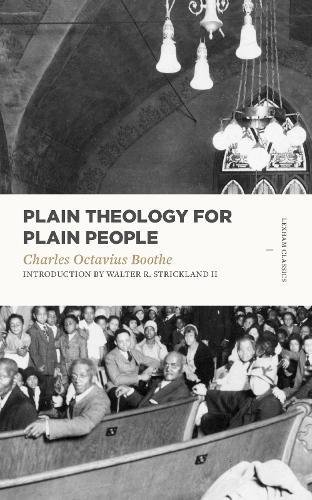Reviewed by Andrew J. Spencer
Charles Octavius Boothe was born in Alabama in 1845. He was, therefore, born a slave—the property of another human. Boothe was fortunate to learn to read and to be encouraged to do so. Eventually, he would be ordained to the Christian ministry, found the Dexter Avenue Baptist Church where Martin Luther King, Jr. would later serve, and work toward racial reconciliation even amid the rising wave of Jim Crow.
His theology, recently republished by Lexham Press, is a marvelous artifact of African American history. It is an early example of theologizing by African Americans for African Americans. As Walter Strickland writes in the introduction, “Plain Theology for Plain People shows black evangelicals that they belong in the broad evangelical tradition.”
It would be a mistake, however, to consign this volume to a category of primary sources read solely to hear the voice of a particular sort of person. It is that, to be sure. But Plain Theology for Plain People is a work of theology that deserves to be encountered on its own merits, without recourse to a “diversity vote” or any other excuse for reading this volume.
Boothe’s volume is a concise systematic theology that covers the usual doctrinal heads. He deals with theology, anthropology, soteriology, Christology, ecclesiology, and eschatology. There is also a heavy emphasis on practical theology, both in a general commentary throughout each chapter and in a dedicate chapter on the Christian life. Boothe doesn’t use those titles, of course, because, as Strickland notes, “Boothe wrote for the average sharecropper.” That is, he wrote plainly for people without much education.
Certainly, there are differences between modern systematic theologies and Plain Theology for Plain People. Boothe mentions very few sources in his text. Contemporary systematics often have a labyrinth of citations, because they are usually written for an audience that is aware of various debates in church history and, in our time, authors need to show they are aware and have properly interacted with all the right arguments to be deemed credible.
What Boothe does is less complex. Much of this concise volume consists of Boothe quoting Scripture. In fact, were someone to attempt to update this volume using a contemporary translation, they would almost certainly need special permission from the publisher. There are points where the book seems more a biblical theology than a systematic one, though he certainly intends to cover the traditional doctrines in a systematic manner. Boothe speaks to his audience, which is comprised largely of people who revered Scripture, therefore he synthesized Scripture to help his audience understand the Christian religion systematically.
Not only is the approach of Plain Theology for Plain People simple, but the language is simple, too. That is not a criticism, but a compliment. Even though this little book was originally published in 1890, it could be used today with new believers or in a high school theology course. This volume is exemplary in its avoidance of technical terms, a feat too often avoided by learned authors of our day.
The weakness of Boothe’s approach is that it does not engage some of the theological variations of our day. Even among orthodox Christians, there are a wide variety of approaches to issues like the intermediate state, the ordo saludis, and the millennium. Plain Theology for Plain People presents one side of those issues. Boothe does not write polemically, as one might if he dismisses or derides alternative viewpoints. However, he does write narrowly, without introducing his readers to other points of view. This may appear to limit the usefulness of the volume to those who do not agree with Boothe.
The strengths of this volume more than compensate for any faults. More than a century after Boothe penned the volume, it is still clear and theologically sharp. Plain Theology for Plain People is also exceedingly practical, with Boothe emphasizing aspects of orthodox Christian doctrine that are most helpful for right living. As noted above, the volume is Scripture-centric, which These traits combined make the book useful for the devotional reading of theology; Boothe clearly loves Christ, and reading this volume can help the reader grow in his or her love for Christ.
This volume deserves a continued place in the library of pastors, laypeople, and scholars. For academic theologians, this book serves as an exemplar for how to write for the people who often need clearly written theology the most. Walter Strickland and Lexham Press have done a service for the Church by reintroducing this volume to contemporary readers.
Andrew J. Spencer (PhD, Southeastern Baptist Theological Seminary) blogs at EthicsAndCulture.com and works as an operations instructor in commercial nuclear power.
